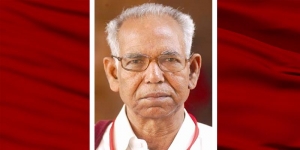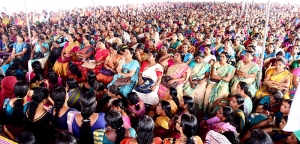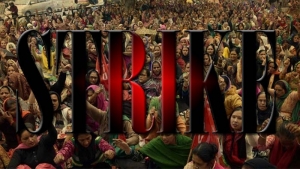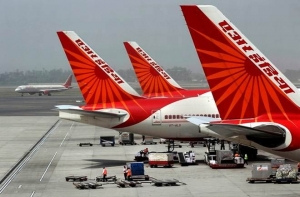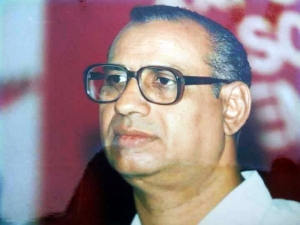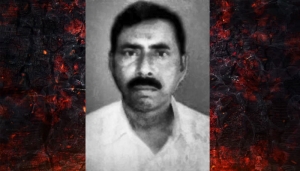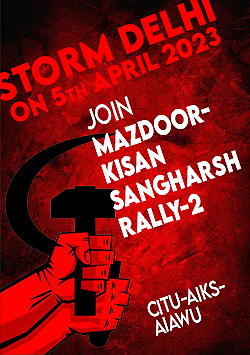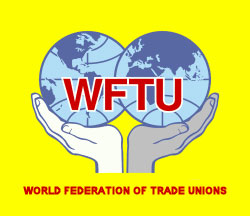Super User
Comrade Md. Amin Amar Rahe
The Centre of Indian Trade Unions is profoundly grieved on the passing away of its veteran leader as well as the leader of the working class movement of the country Comrade Md. Amin today on 12 February 2018 in Kolkata at the age of 89. Comrade Md. Amin was the founder member of CITU, became its General Secretary in May 2007 and continued in that position till March 2010.
Born in a working class family Comrade Md Amin became a jute mill worker in West Bengal at the age of 14 and was initiated in trade union struggles at shop floor. He held various responsibilities in West Bengal as well as at national level.
He was elected, as the secretary of CITU in 1987 and later became its vice president apart from discharging his responsibility as its General Secretary during 2007-2010. He was associated with several industry-wise federations in jute, road transport etc. During these long years he had been playing a crucial role in leading the working class movement in the country.
Comrade Md. Amin was a member of Rajya Sabha during 1988-94 and 2007-13. He was the transport minister in the first Left Front government and was the labour minister in the sixth Left Front government of West Bengal.
Comrade Md. Amin joined the communist party in 1946 and was jailed for long periods. He rose at the highest level as a member of the Polit Bureau of CPI(M) and, as a veteran communist, continued to remain in its Central Committee as a special invitee till his demise.
Comrade Md. Amin was a poet in Urdu and was the author of several books. His life was an example of commitment, simplicity and courage.
CITU sends its heartfelt condolence to his comrades and members of his family. CITU dips its flag and pays its respectful homage to the departed leader.
THE UNION BUDGET 2018-19: ANTI-PEOPLE ANTI-WORKER AND DECEPTIVE
The Union Budget 2018-19, presented by the Finance Minister of the Narendra Modi Govt today on a preliminary scrutiny, turns out to be deceptive one, meticulously articulated to misguide and confuse the people. The Budget is anti-workers, anti-people and also militates against the national interest. CITU condemns such an anti-people exercise.
The Budget remained liberal about extending concession to business houses. On the plea of supporting Micro, Small and Medium Scale Enterprises (MSMEs) the Budget extended the reduced corporate tax rate of 25% to companies having Rs 250 crore annual turnover. Is the turnover the right measure of identifying an MSME or the ‘capital deployed’ should categorise the MSME more honestly ? Will it really benefit the genuine MSMEs or allow the big players to corner the benefit ? However through such deceptive manner the burden on corporate houses has been reduced further by Rs 7000 crore while giving no relief to suffering millions reeling under post GST indirect tax burden. This along with other pro-corporate policy drives continued to remain the pattern of budget exercise of the Modi Govt in successive years of its governance pushing the entire country in the midst of extreme and obscene income inequality of one percent people cornering 73% of the national wealth. And yet the Govt will continue to call itself pro-poor.
Budget speech made no mistake in mentioning its resolve to extend the atrocious “fixed term employment” system to all the sectors consistent with its brazenly anti-worker pro-corporate drive for labour-law changes designed to impose slavery on the workers. While speaking lavishly about improving health, education and social welfare services toward universalisation, it remained totally negative in considering the long standing demands of about a crore workers working in its flagship scheme of NHM, Mid-day-Meal(MDM) and ICDS (Anganwadi) and other related central govt schemes of extending them at least the right to statutory minimum wages and attendant social security benefits. In fact the allocation under National Health Mission (NHM) has been reduced and on ICDS and MDM there are marginal increase that too for other expenditures. Such an attitude is utterly condemnable.
CONGRATULATE THE ‘SCHEME WORKERS’ FOR SUCCESSFUL ALL INDIA STRIKE
The Central Trade Unions congratulate the scheme workers working in various Government Schemes for their successful all India Strike and mobilisation today, 17 January 2018. Nearly twenty lakh scheme workers came out on streets in demonstrations, rallies and dharnas at district headquarters across the county and submitted memorandum addressing the Finance Minister through the district authorities.
As per the decision of the Mahapadav of workers held on 9-11 November 2017, the Central Trade Unions had given the call for a one day strike of all ‘scheme workers’ to press for the following demands:
1. Implement the recommendations of the 45th ILC on scheme workers: recognition as workers, minimum wages not less than Rs.18,000 per month and social security including monthly pension not less than Rs.3000 to all scheme workers. Give coverage of EPF and ESI to scheme workers.
2. Adequate financial allocation in the Union Budget 2018-19 for the Centrally sponsored schemes including ICDS, MDMS, NHM, SSA, NCLP etc to ensure increase in wages for the workers to the level of minimum wages and universalisation of the schemes with adequate infrastructure and quality services.
3. No privatisation of the schemes in any form and no subversion by way of cash transfer or exclusion of beneficiaries
Nearly 60 lakh Scheme workers including anganwadi workers and helpers, mini anganwadi workers, ASHA workers, Mid Day Meal workers, NCLP teachers, small savings agents, workers under SSA, NRLM, MNREGA field assistants, par teachers, etc went on strike today. These grass root workers, majority of whom are women who deliver the services of nutrition, health, education and care are not recognised as workers by the government, who is their employer and paid a pittance in the name of ‘honorarium’ which is far less tahan the minimum wage. The strike was a total success in spite of the threat by the various governments. In many states the workers were threatened with retrenchment and wage cut of one week to a month wages for a one day strike. In Telengana one DRDO issued notice to the NREGA field assistants that their strike is against the sovereignty and integrity of the Nation! Apart from this the BMS, which has totally surrendered to the Modi government, has also tried to misguide the workers.
ALL INDIA STRIKE OF ‘SCHEME WORKERS’ on 17 JANUARY 2018
By Central Trade Unions on 17 JANUARY 2018
Workers will March From Mandi House to Parliament Street at 11am
As per the decision of the Mahapadav of workers held on 9-11 November 2017, the Central Trade Unions have decided to go on a one day strike of all ‘scheme workers’ working under various Government Schemes on 17 January 2018. More than one crore scheme workers are working under various central and state government schemes including around 27 lakh Anganwadi, Mini Anganwadi Workers and Helpers under the ICDS Scheme, nearly 28 lakh Mid Day Meal Workers under the MDM Scheme and around ten lakh ASHA Workers under the NHM, lakhs are working under SSA, NRLM, NCLP, Small Savings Schemes etc will go on strike tomorrow and will hold rallies, demonstrations, dharnas etc at district level and submit memorandum through district authorities to the Finance Minister, Government of India.
These schemes deliver basic services of health, nutrition education etc to the mass of the population. These workers are not recognised as workers and are not paid minimum wages nor do they have any social security benefits. In the name of ‘honorarium’ or ‘incentive’ they are paid a pittance as low as Rs.1000 per month for ten months a year in the case of mid day meal workers. The 45th Indian Labour Conference recommended that these workers must be recognised as workers, must be paid minimum wages and given social security benefits including pension. Various trade union federations of scheme workers have been conducting struggles raising these demands independently and jointly. But neither the UPA nor the NDA government was ready to implement these ILC recommendations.
Moreover, the Modi led NDA government is moving towards winding up these crucial schemes such as ICDS, NHM and MDMS by drastic budget cuts and structural changes, including privatisation of the schemes involving corporate and corporate NGOs. The beneficiaries are actually being excluded in the name of linking of Aadhar and bank accounts. The government is introducing conditional cash transfers in place of universal services of crucial schemes including the ones which ensure food security. The remuneration of the workers and the facilities of the schemes are being affected due to the budget cuts. In spite of repeated demand by the central trade unions, the Government is going ahead with moves to dismantle the schemes.
CITU DENOUNCES GOVERNMENT’S MOVE ON LIMITLESS FDI IN AIR-INDIA AND RETAIL TRADE
The Centre of Indian Trade Unions (CITU) denounces the Government’s announcement of allowing 49 per cent FDI in the country’s national carrier – Air India. Modi Govt had already decided to push Air India for wholesale privatization. And to expedite such privatization move, the Govt has now made this announcement of permitting 49 per cent FDI. Actually, this is nothing but complete foreignisation of the national carrier – a public sector company with its huge asset base and a high-revenue earning international service network.
The Govt of the day is making the plea of huge loss the Air India is being burdened with to justify privatisation. But the Govt seeks to hide the fact that Air India has been pushed to this situation not because of its management’s failure but owing to imposition of disastrous decision on the company by successive governments at the Centre like hasty merger of Indian Airlines and Air India; forcible procurement of huge fleet of aircrafts from foreign companies through direct purchase at an in-opportune time thereby imposing on the company an unbearable burden of indebtedness leading to loss. Despite such reckless and imprudent misadventure and subsequent hurdles imposed by the successive Govts, including the current one through the concerned Ministry, Air India struggled to come back to operating profit for last three years. Despite that, the present Govt decided to privatise the national carrier, and to hasten up the process, the door is now widely opened for the foreign companies to take over. Such destructive decision is being pursued by the Govt despite the concerned Parliamentary Standing Committee on Transport, Tourism and Culture, comprising of representatives of all the political parties including BJP, unanimously recommending not to privatise Air India, at least for three years more while helping it for speed up its improvement which has already set in. When privatization, rather foreignisation of national assets becomes the main goal of the Govt, then such destructive decision of foreignisation of national carrier is being taken by the Govt completely unconcerned of the national interests. CITU vehemently condemns such destructive move.
Equally destructive is the decision of the Govt of allowing 100 per cent FDI in single brand retail trade, which in the background of fast corporatization of the retail trade sector has already been putting existing decentralized retail trade sector in severe difficulties and crisis. Allowing 100 per cent FDI in single brand retail trade will further increase the hardship of traditional retail trade sector which is the second biggest livelihood giver after agriculture and expedite the ruin of the traditional retail trade sector.
CITU condemns these destructive and reckless decisions on FDI, which are destined to damage the national economy and reduce employment, and calls upon the working class to build up determined resistance against such deliberate exercise towards degeneration of the national economy and peoples’ livelihood both through sectoral and nationwide united struggle.
Issued by,
TAPAN SEN
General Secretary
Com. N.M. SUNDARAM Passed away
The Secretariat of the Centre of Indian Trade Unions, in session in New Delhi expresses its shock over the sudden demise of Com. N.M. Sundaram, one of the senior leaders of Indian Trade Union movement and especially that of the Insurance Workers Movement today on 26.12.2017 at Chennai. He was 80.
Com. Sundaram, had led the All India Insurance Employees Association, in various capacities including that of the General Secretary for Sixteen years and President for six years. He had played a major role in the struggle of the Indian Working people against privatization and other disastrous impacts of neo liberal economic policies. He was a prolific writer and orator and had written articles and books on various aspects of neoliberal economic policies.
CITU pays its homage to the memory of Com. Sundaram and also conveys condolences to his family members and to the Comrades of AIIEA.
(TAPAN SEN)
General Secretary
CITU DENOUNCES FIRING BY GARDEN-OWNER ON TEA GARDEN WORKERS IN ASSAM
DEMANDS STRINGENT ACTION ON THE EMPLOYER BY STATE/CENTRAL GOVT
AND APPRORIATE COMPENSATION TO THE VICTIMS
THE Centre of Indian Trade Unions expresses shock and vehemently condemns the indiscriminate firing on the tea garden workers by the Tea Garden Owner on 13th December 2017 which is reported by the media.
It is learnt that the workers of Bogidhala Tea Estate in Golaghat district of Assam have not been getting their earned wages since long despite continuously working in the Garden. On that fateful day a section of workers went to the Bunglow-Office of the Tea Garden Owners to press for payment of their earned wage pending since long putting the workers in virtual starvation and distress. The arrogant tea garden owner suddenly opened fire on the assembled workers, squatting peacefully before the Bunglow without any provocation injuring at least twenty workers. The injured workers have been rushed to Jorhat Medical College Hospital and at least five of the injured workers are in extremely critical condition.
It is most deplorable that the workers have to face bullets from the garden-owner for demanding their unpaid earned wages for the work already done; non-payment of earned wages to workers on time is a serious offence on the part of the employers. The workers and their unions have been complaining against such non-payment and irregular payment since long. But the Govt, both in the state of Assam and in the centre have not taken any action against the defaulting employer, may be owing to their over-occupation in ensuring “ease of doing business”. This enthusiasm of the BJP government over “ease of doing business” has emboldened the employer to such an alarming degree, that while deliberately defaulting in regular payment of wages to workers, they launched murderous assault on the workers demanding their legitimate earned wage. This is nothing but a criminal offence on the part of the concerned tea-garden owners. Such attacks have now, particularly under the new state government, become a regular phenomenon on the tea garden workers in Assam, who contribute almost half of the tea production in the country.
CITU strongly denounces such anti-worker attitude of both the tea garden owners and the Govts conniving with the employers in repressing and looting the workers. CITU demands immediate arrest of the tea garden owners and initiation of stringent action for their criminal and murderous offence. CITU also demands immediate release of payment of all pending wages to the workers and adequate compensation to all the injured workers, many of them are lying in critical condition.
(Tapan Sen)
General Secretary
CITU condemns the barbaric murder of Afrazul
The Centre of Indian Trade Unions (CITU) condemns the barbaric murder of an innocent migrant worker Afrazul, from Malda district of West Bengal, in Rajsamand district of Rajasthan on 6 December by axing and burning alive; and videographing and uploading the episode in social media as an act of bravery against the purported love jihad'. The killing of innocent minorities, to foment communal hatred and division, has repeatedly been taking place in the country, more so in Rajasthan, since BJP came to power at the Centre. The Rajasthan State government is guilty of ignoring Supreme Court's order, on protecting the innocents against such attacks and appointing nodal police officers in all districts. Instead, police in Rajasthan is busy in cover up exercise of such attacks. Another vital issue involved in the gruesome murder of Afrazul is about protection of safety, rights and livelihood of migrant workers, both inside and outside the country, which have become important issues of the trade union movement at national, international levelS and in ILO. CITU demands of Rajasthan government to immediately arrest the culprits, involved in the murder of the migrant worker Afrazul and in the hate propaganda through social media; adequate compensation to the bereaved family; implementation of Apex Court's order against such attacks and measures to protect all migrant workers in the State.
Tapan Sen
General Secretary
Modi Government Responsible for Shocking Suicide by DCIL Worker
The Secretariat of the Centre of Indian Trade Unions (CITU) has issued the following Statement.
Venkatesh, a 29 year young worker of DCIL and the lone bread-earner of the family of two sisters and parents, committed suicide on 4 December, 2017 in protest against Modi Government's decision to Completely privatise the Dredging Corporation of India Ltd (DCIL) with headquarter at Visakhapatnam. In a delegation, Vankatesh met the local BJP M.P and BJP MLA and urged their intervention against privatisation of DCIL. But, shockingly, both of them refused on the ground that BJP's Central Government had already taken decision to privatise DCIL. In a Suicide note Venkatesh accused Modi Government for its decision to privatise DCIL and local BJP MP and BJP MLA for their refusal to intervene as the reason for his frustration and Suicide. Despite protests and representation by CITU and other trade unions, the Government decided to privatise DCIL. The Workers and the executives of DCL hace since Were Conducting joint agitation demanding reversal of the decision of privatization of DCIL. It is very important to note that the financial performance of DCIL is excellent in that it has been earning profit, generated huge assets including liquidity. Therefore, handing over DCIL to private business is a criminal compromise with the economic strength and interest of the nation and is yet another instance of transferring national asset to private capital by the corporates captive Modi Government. Service to the nation, provided by the DCIL, is better testified from the fact that DCIL has been maintaining our national maritime and navigational facilities of waterways catering yeoman services to all the major and minor ports in the Country, thereby, facilitating international trade and cargo movement. In fact, DCIL was created under public sector to deliver dredging service to the nation to keep the ports as well as channels navigable to facilitate smooth movement of vessels with larger draft. Moreover, DCL has also successfully expanded its dredging services beyond the Country's boundary and has been earning precious foreign exchange executing foreign Orders. CITU condemns Modi Government, being responsible for the shocking Suicide of Venkatesh; demands reversal of the privatization decision of DCIL, demands adequate compensation to the family of deceased and employment to a member of the family. CITU extends full support and solidarity to the ongoing and forthcoming struggle of the DCIL Workers and executives and appeals to the Working class to extend Solidarity with the DCIL Workers.
Swadesh Dev Roye
Secretary, CITU
Letter to Finance Minister
Dated 05.12.2017
The Hon’ble Minister of Finance
Government of India
North Block,
New Delhi, 110 001
Sub: Trade unions view point on issues to be considered for framing budget for the year 2018-19
Sir,
To start with, we urge you to take the views presented jointly by the trade unions and incorporate them in the budget proposals so that this meeting would be meaningful. We request you not to convert this meeting into a mere a ritual.
Please recall that the Group of Ministers headed by you had an inconclusive discussion with the trade unions on the 12 point charter of demands of the working people of the country, in August 2015. The GoM did not resume the discussions despite requests from the central trade unions. The discussion the Labour Minister held with the central trade unions on 7th November 2017 did not yield any results.
Hence, we feel compelled to reiterate our demands again and present our views as follows:
• Increase budgetary allocations for social sector: The government should increase allocations on social sector and basic essential services like health, education, food security etc in the Union Budget. The necessary financial resources should be raised internally by taxing the rich who have the capacity to pay.
• Effective measures against deliberate tax and loan repayment defaults: Effective and firm measures should be taken against deliberate tax default by the big business and corporate lobby to curtail the huge accumulation of unpaid taxes, which have been continuously increasing. Further, wilful default should be made a criminal offence, the list of wilful defaulters should be made public and stringent measures such as fast track Debt Recovery Tribunals should be implemented.
• Minimum wage: Minimum wage fixed on the basis of the recommendations of the 15th Indian Labour Conference and the Supreme Court judgment in Raptakos & Brett case and linked to Consumer Price Index, should be guaranteed to all workers. The 7th Pay Commission has worked this to be Rs 18000 per month, which the government has accepted. Hence, the minimum wage should not be less than Rs 18000 per month, which has been the common demand of all the central trade unions. Need based minimum wage should be considered as an essential part of social security.
• Resolve demands of the Government employees regarding 7th Pay Commission: All the pending demands of the Government employees in centre and states in regard to 7th pay commission be resolved within time frame including arrears of allowances with effect from 01.01.2016. The autonomous bodies be included into for all the benefits of the 7th pay commission.
• Price rise: The prices of essential commodities, particularly of food items have been spiralling making it impossible for the workers and other toiling people to meet their basic daily needs. Speculative forward trading and hoarding are major factors contributing to the price rise. The government should ban speculative forward trading in essential commodities, take strong measures to curtail hoarding and strengthen Public Distribution System, making it universal. Stop the system of cash transfer to beneficiaries’ accounts in lieu of PDS
